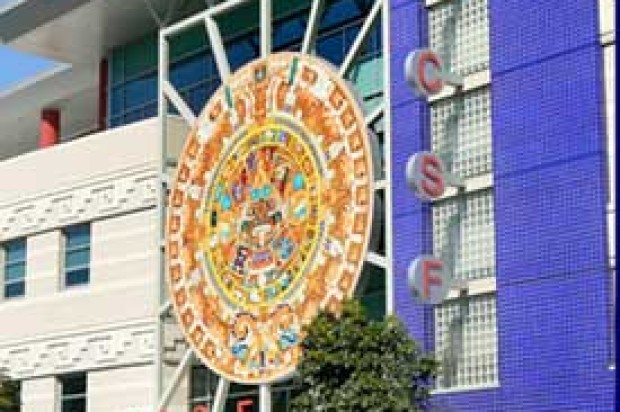
City College of San Francisco officials knew for months that a building housing English as a Second Language and other classes in the Civic Center neighborhood was seismically unsafe and had to close but made no announcement until Friday, three days before the start of the new semester.
School officials told faculty in a meeting Friday that the Civic Center campus at 750 Eddy St. would close and classes would be postponed until Feb. 2 and moved to the CCSF Administration Building at 33 Gough St., according to members of the faculty and administration.
The college informed students via a Facebook post Friday and had employees standing outside the school to give instructions to students who showed up for the first day of class today.
The building, first constructed as an elementary school in 1910, was determined to be at risk of collapse in an August report by Concord-based TBP Architecture.
While the report was commissioned to identify improvements the school could get started on in 2016, the problems identified were so severe that school officials concluded in November that the building was not safe to inhabit and needed to close, CCSF spokesman Jeff Hamilton said.
Before closing the school, the administration wanted to have a workable plan to where it was going to move the classes but wasn’t able to come up with one until last week, Hamilton said. The school examined leasing space nearby but eventually decided to simply move the classes to the Gough Street building.
The Civic Center Campus, formerly Adams Elementary School, was taken over by City College for adult education programs in the 1930s. As many as 500 students per day and 2,000 per year attend classes there.
Aside from Americans with Disabilities Act upgrades in the 1990s and repairs done after the 1989 Loma Prieta earthquake, there have been few improvements done to the building since its construction, according to the TBP report.
The report found numerous problems with the site and recommended either renovating the building at a cost of nearly $13 million or tearing it down entirely.
CCSF officials have not made a decision whether it will renovate or demolish the building, Hamilton said. The school is in the process of securing state funding for improvements.
Aside from the seismic concerns, the report said the redwood roof is constantly failing and new leaks appear each rainy season.
Heating and plumbing systems have not been replaced since the building’s original construction and ductwork had failed, leaving half the building without heat, according to the report. Some faculty use portable space heaters in classrooms that pose as a fire hazard.
The building has lacked a functioning hot water heater for several years.
The building’s electrical system is not up to code and frequently fails. It was not designed to power modern computer systems, according to the report.
There is asbestos in the floor tiles and lead in wall and ceiling paint. Offices are housed in classrooms separated by cubicles but lights and radiators are not suited for this configuration.
The campus police are housed in the building’s basement with no easy monitoring of lobby and stairways, creating a risk of crime, particularly given the building’s location in the high-crime Tenderloin area, according to the report.
American Federation of Teachers Local 2121 president Timothy Killikelly criticized the administration’s handling of the issue today, saying that either the building isn’t as unsafe to inhabit as they say, or that they knowingly had faculty and students working in an unsafe environment for all of last semester.
He said he and faculty at the school met with CCSF Chancellor Arthur Tyler over the weekend and was told that the administration decided to close the building on Jan. 5, but didn’t inform faculty until Friday.
These lapses of communication, including postponing classes and potentially changing work hours and schedules, are a violation of the faculty’s labor agreement, he said.
“They can’t unilaterally change work hours and schedules,” Killikelly said.
The union is still figuring out what action it will take because of that.
Meanwhile, faculty at the school is figuring out what this means for their classes, whether schedules will have to change or be condensed, or whether the classes will have to be extended further into the summer.
And students are figuring out when and where they’re showing up to class. Killikelly said that administration staff meeting students outside the Ellis Street office today only spoke English and weren’t able to easily communicate with the students looking for ESL classes.
Some students, confused after going to the Ellis Street location, immediately went to the Gough Street building still expecting their classes to begin today, Killikelly said.
Scott Morris, Bay City News









